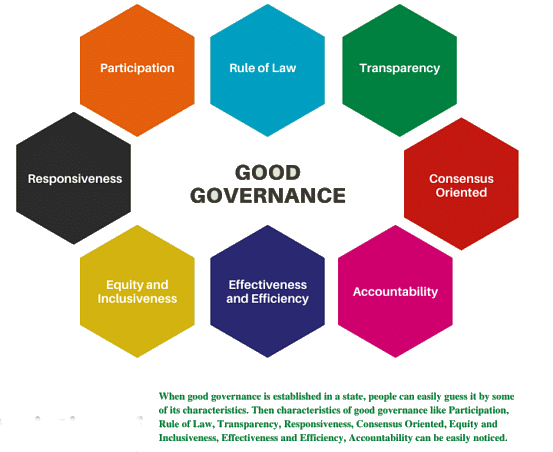Good Governance: Concept and Application | Public Administration Optional for UPSC (Notes) PDF Download
| Table of contents |

|
| Introduction |

|
| Definitions of Good Governance |

|
| 8 Major Characteristics of Good Governance |

|
| Importance of Good Governance |

|
| Conclusion |

|
Introduction
Good governance is a crucial element in mobilizing a country's people towards progress and development. It fosters unity within society and motivates individuals to pursue political objectivity. At its core, good governance ensures the effective and sustainable utilization of a nation's resources for the betterment of its citizens. This article delves into the definitions, major characteristics, and the significance of good governance in various domains of society.
Definitions of Good Governance
Various institutions and organizations have provided definitions of good governance, each emphasizing its significance in different aspects of a nation's development:
- World Bank: The World Bank views good governance as central to creating and sustaining an environment that fosters strong and equitable development. It complements sound economic policies and promotes broad consensus in society, giving voice to the poorest and most vulnerable in decision-making processes.
- UNDP: The United Nations Development Programme defines good governance as a participatory, transparent, and accountable system that promotes the rule of law. It ensures that political, social, and economic priorities are based on societal consensus and allocates development resources inclusively.
- International Monetary Fund (IMF): The IMF defines good governance as a broad concept encompassing all aspects of a country's governance, including economic policies, regulatory frameworks, and adherence to the rule of law. It emphasizes the effective management of public resources and the establishment of a transparent and stable economic environment for private sector activities.
Recent Developments in Good Governance
Mohit Bhattacharya, in his work on good governance, highlights three key developments:
- Wider Scope of Public Administration: Good governance expands beyond the formal government to encompass a broader understanding of public administration.
- Aid Conditionality: Good governance has become a term dictated by external actors to prescribe conditions for aid provision.
- Democratic Intensifying Concept: Good governance aims to make public administration more open, transparent, and accountable, fostering a genuinely democratic approach to governance.
8 Major Characteristics of Good Governance
To establish sound economic management and a healthy relationship between the state and civil society, good governance exhibits eight major characteristics:
- Participation: The active involvement of citizens in the decision-making process is a key aspect of good governance. Informed and organized participation enables the fulfillment of political rights and strengthens societal objectives.
- Rule of Law: Good governance requires a fair legal framework that upholds the rule of law. This framework ensures impartiality, protects human rights, and fosters societal inclusivity.
- Transparency: Governance relies on transparency to deliver services fairly. By following proper rules and regulations, transparency facilitates access to government information, promoting accountability and understanding among citizens.
- Responsiveness: Good governance necessitates timely and sufficient services to maintain a constructive relationship between the administration and the people.
- Consensus-Oriented: Governance relies on societal consensus to align with the interests of the community, contributing to long-term human development. This characteristic emerges from the cultural and institutional behaviors of a particular society.
- Equity and Inclusiveness: Good governance strives to establish an equitable society where all members feel included and have a stake in governance. It ensures fair treatment, regardless of background, fostering a sense of belonging.
- Effectiveness and Efficiency: Good governance focuses on utilizing society's resources effectively to achieve sustainable development. It also emphasizes the sustainable use of natural resources, safeguarding the environment.
- Accountability: Accountability is a cornerstone of good governance, requiring governmental bodies, private sectors, and civil society organizations to be answerable to the people and their stakeholders. Transparency and the rule of law are essential to establishing accountability.
 Characteristics of Good Governance
Characteristics of Good Governance
Importance of Good Governance
The significance of good governance in a state encompasses multiple domains:
- Economic Development: Good governance establishes stable economic development by removing obstacles in production, distribution, investment, and consumption. It enables the fair allocation of resources, ensuring economic stability.
- Social Development: Beyond economic growth, good governance plays a vital role in social development. It ensures fair wealth distribution among diverse societal groups, reduces social disparities, and promotes laws that address gender and minority gaps.
- Political Development: Political leaders are instrumental in establishing good governance within a country. Their dedication to adherence and cooperation with political institutions and parties fosters healthy competition and effective governance.
Conclusion
Good governance entails the proper management of a state, society, and resources, prioritizing the interests of all classes. Its characteristics, such as participation, rule of law, transparency, responsiveness, consensus orientation, equity and inclusiveness, effectiveness and efficiency, and accountability, contribute to political, economic, and social development. By protecting the rights of citizens and fostering inclusive progress, good governance establishes a solid foundation for a nation's advancement.



















